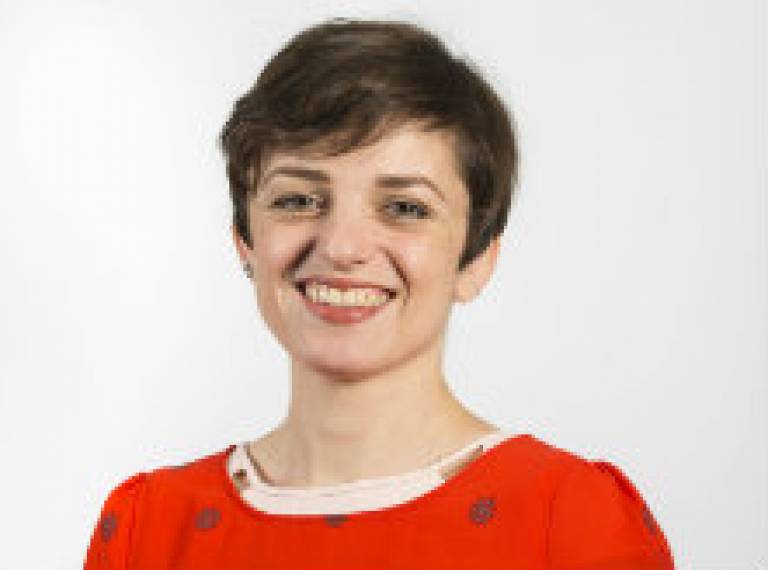Spotlight on Dr Katherine Woolf
15 September 2016
This week the spotlight is on Dr Katherine Woolf, Senior Lecturer and Divisional Deputy Lead for Research, UCL Medical School.

What is your role and what does it involve?
I'm a Senior Lecturer in the UCL Medical School and Divisional Deputy Lead for Research. I'm also an Honorary Research Associate in Psychology.
A psychologist by background, I study medical students' and doctors' academic performance to understand more about what helps students do well and what hinders their performance. I'm particularly interested in understanding why ethnicity impacts on performance, and what we can do to make medical education - and higher education in general - fairer.
I'm the Deputy Lead for Year 2 of the undergraduate medical programme (the MBBS) where I work mainly on ensuring the psychometric rigour of the examinations. My teaching concentrates mainly on research methods and I also teach on some Psychology courses.
How long have you been at UCL and what was your previous role?
I've been at UCL since 2004, which I think qualifies me as a 'lifer'. Before coming here I worked as a research assistant at Goldsmith's studying musicians with savant syndrome, and for an MP in Parliament.
What working achievement or initiative are you most proud of?
I feel most proud when I feel I've helped my students learn something new. I love it when the undergraduates I supervise get firsts for their research projects, it was brilliant watching my first PhD student Kasia Ludka graduate last July, and I'm so proud of current PhD student Emily Unwin for getting so much attention for her paper about male doctors being over twice as likely to get in trouble as female doctors. It was also really nice giving the British Science Association Charles Darwin Award Lecture last year.
Tell us about a project you are working on now which is top of you to-do list?
I'm currently working on the second part of a General Medical Council-funded research project on the fairness of medical training. Doctors from Black and Minority Ethnic groups tend to underperform compared to white doctors, and our research is tries to find out why and what we can do about it. In the first part of the project we interviewed doctors in training and their trainers (report here: http://www.gmc-uk.org/about/research/29485.asp and blogpost here: https://gmcuk.wordpress.com/2016/07/21/fair-training-pathways-understanding-differential-attainment-in-medicine/ ) and we are now going on to get perspectives from Medical Royal Colleges and NHS Employers.
What is your favourite album, film and novel?
What a difficult question!
Two albums I could and have listened to over and over again are Is This It by the Strokes and I Never Loved A Man The Way That I Love You by Aretha Franklin. I can always listen to a bit of Handel's Messiah too.
Two films that stand up to repeated watches are The Commitments and Pulp Fiction. I love Walt Disney's Fantasia, and I've just seen Ticked, which made me feel very odd indeed.
I always have a book on the go as well as a huge pile of books on my bedside table that I wonder if I will ever get through. I'm currently reading The Shepherd's Life by James Rebanks. My most recent favourite books are Americanah by Chimamanda Ngozi Adiche and A Book for Her by Bridget Christie.
What is your favourite joke (pre-watershed)?
In Blackadder Goes Forth, Blackadder and George are looking at Baldrick's painting.
George: Private Baldrick is obviously some kind of impressionist.
Blackadder: The only impression he can do is of a man with no talent.
Who would be your dream dinner guests?
My friends and family! Failing that, I reckon with Charles Darwin, Jesus, Oliver Sacks, Chimamanda Ngozi Adiche, Jimmi Hendrix, Stewart Lee, Bridget Christie, Mozart, Elvis Presley, Malala Yousafzai, Kit Gayford, and Stanley Milgram you'd have some inspiring conversation, a good laugh, and a bit of a sing-song. I'd ask Yotam Ottolenghi to do the cooking (and join us for dinner too of course!).
What advice would you give your younger self?
Listen more, you might learn something.
What would it surprise people to know about you?
Between the ages of 5-14 all my schooling was in French. My parents don't speak it which meant I could be creative in how I translated the school's letters home.
What is your favourite place?
The cabin of my narrowboat at dawn drinking tea with my partner.
 Close
Close

